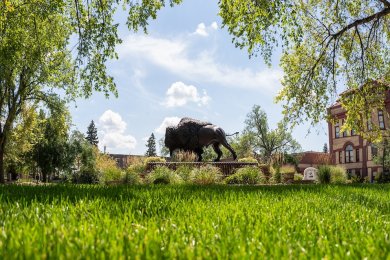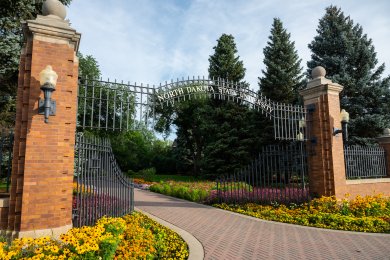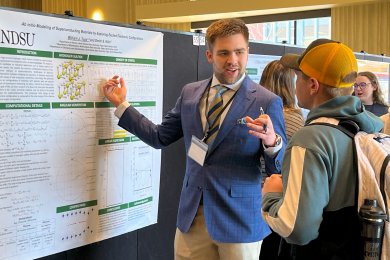
Ryan Burciaga’s first impression of NDSU was as a rival. He plays for the Mississippi Valley State University football team and was on the bench as a freshman in 2006 when they played the Bison at the Fargodome. He had never been in an indoor stadium before.
"The crowd was amazing," he said. "Loud cowbells and things like that. You couldn't hear anything."
The next year, he played his first game as starting quarterback against NDSU and scored his first collegiate touchdown.
This summer, as a senior in biology, Burciaga returned to NDSU--but this time he traded the gridiron for the greenhouse. Burciaga and others from MVSU and Northern Arizona University spent eight weeks working with NDSU professors on research projects. The program is designed to increase student diversity.
The idea began two years ago when Evie Myers, vice president for Equity, Diversity and Global Outreach, and Deland Myers Sr., professor and director of the School of Food Systems, were tasked by President Joseph Chapman to find ways to get underrepresented students to campus, particularly in the science fields.
Typically, when universities want to increase their demographics, they recruit at historically black and Hispanic serving colleges and universities as well as tribal colleges. As the NCAA faculty representative, Deland knew NDSU already had a connection with Mississippi Valley State University in Itta Bena, a historically black university, through football. He and Evie worked with the university to bring 10 students to do research in NDSU laboratories during the summer of 2008.
"We're using athletics as a catalyst to get to develop partnerships with these universities," Deland said. "President Chapman always said that he viewed the move to Division I to be beyond athletics. This demonstrates that."
This year they reached out to Northern Arizona University in Flagstaff as a result of the men's basketball team playing them in a non-conference basketball game. Deland and Evie also had connections with the vice president of student affairs at the university. NAU has a significantly larger enrollment of Hispanic and American Indian students compared to Mississippi Valley State University. This partnership increases the diversity of students that can be recruited to the summer internship program. This summer, NDSU hosted nine students from MVSU, six from NAU and another from Cankdeska Cikana Community College, a tribal college in Fort Totten, N.D.
Students participate in ongoing research projects for NDSU professors, participate in lab activities, and are often acknowledged as co-authors of research publications. Students worked with faculty members in biology, plant sciences, pharmacy, cereal science, soil science, plant pathology, communications, computer science, natural resources and exercise sciences.
"We wanted students to understand that they will work on real research projects," Deland said. "We choose the best students, so these are very capable and do good research."
The goals of the program are threefold – to give students a graduate research experience, to encourage students to consider graduate school, and to provide students an up-close look at North Dakota’s people and places.
Burciaga has experienced all three goals. He spent the summer researching the effects of a specific toxin on wheat plants to determine whether the plants' mitochondria have anything to do with resistance to the disease. With this experience, he will be able to present his research at conferences. Before NDSU, Burciaga was set on going into medicine. Now, he feels he has more options available.
"There's more than one way you can use your biology degree," he said. "This opened my eyes to see other fields that I can get into."
He has also enjoyed getting to know Fargo and the people here and plans to recommend the program to others, although he did keep quiet about his summer plans around his football teammates.
"I didn't tell most of them, just for the fact that we did play each other," Burciaga said. "I kept my mouth shut about that. They know about this school. All of them do."
Funding for the program comes from NDSU, the National Science Foundation and Cargill. Plans are to continue the program with a concerted effort to include more students from tribal colleges around the state.




